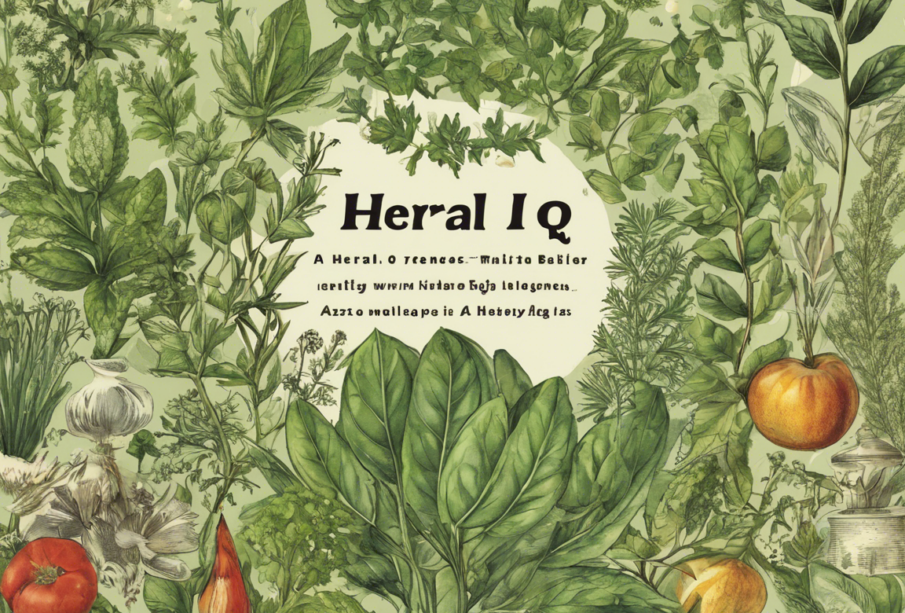Unlocking Your Herbal IQ: A Beginner’s Guide to Herbal Remedies, Recipes, and Benefits

Herbal remedies have been used for centuries to promote health and well-being. As many people are turning towards natural alternatives for healing and self-care, herbal remedies are gaining popularity once again. If you are a beginner looking to delve into the world of herbal medicine, this guide will help you understand the basics of herbal remedies, learn about popular herbs and their benefits, and explore simple recipes to kickstart your herbal journey.
Understanding Herbal Remedies
Herbal remedies, also known as herbal medicine or herbalism, involve using plants or plant extracts to treat various ailments and promote overall health. This practice is based on the ancient belief that herbs contain natural healing properties that can be beneficial to the body. Herbal remedies can come in many forms, including teas, tinctures, capsules, essential oils, and salves.
Benefits of Herbal Remedies
- Natural Ingredients: Unlike synthetic medications, herbal remedies are made from plant-based ingredients, making them a natural alternative for those who prefer to avoid chemicals.
- Fewer Side Effects: Herbal remedies are often gentler on the body and may have fewer side effects compared to pharmaceutical drugs.
- Holistic Approach: Herbal medicine takes a holistic approach to healing, focusing on treating the underlying causes of health issues rather than just the symptoms.
- Affordability: Herbal remedies can often be more cost-effective than prescription medications, making them accessible to a wider range of people.
Popular Herbs and Their Benefits
1. Lavender
- Benefits: Known for its calming and relaxing properties, lavender is often used to reduce stress and anxiety. It can also help promote sleep and relieve headaches.
2. Echinacea
- Benefits: Echinacea is commonly used to boost the immune system and help the body fight off infections, particularly the common cold and flu.
3. Ginger
- Benefits: Ginger is well-known for its anti-inflammatory properties and its ability to aid digestion. It is often used to ease nausea, reduce muscle pain, and support overall gut health.
4. Chamomile
- Benefits: Chamomile is a popular herb for promoting relaxation and reducing stress. It is also known for its anti-inflammatory and digestive properties.
5. Peppermint
- Benefits: Peppermint is commonly used to soothe digestive issues such as bloating, gas, and indigestion. It can also help relieve headaches and improve energy levels.
Herbal Remedies Recipes to Try
1. Immune-Boosting Tea
- Ingredients: Echinacea, ginger, lemon, honey.
- Instructions: Steep echinacea and sliced ginger in hot water. Add a squeeze of lemon and a spoonful of honey for taste. Drink while warm.
2. Sleepytime Tincture
- Ingredients: Lavender, chamomile, valerian root, alcohol.
- Instructions: Combine dried lavender, chamomile, and valerian root in a jar and cover with alcohol. Let it sit for a few weeks, then strain and take a dropper before bedtime for a restful sleep.
3. Digestive Bitters
- Ingredients: Peppermint, fennel seeds, ginger root, vodka.
- Instructions: Combine peppermint, fennel seeds, and sliced ginger root in a jar and cover with vodka. Let it sit for a few weeks, then strain and take a dropper before meals to aid digestion.
FAQs About Herbal Remedies
1. Are herbal remedies safe to use?
- When used properly and in moderation, herbal remedies are generally safe for most people. However, it is important to do your research and consult with a healthcare professional before using herbal medicine, especially if you have any underlying health conditions or are taking medications.
2. Can I grow my own herbs for herbal remedies?
- Yes, many herbs used in herbal medicine can be easily grown at home in a garden or on a windowsill. This allows you to have fresh herbs on hand for making home remedies.
3. How long does it take to see results from herbal remedies?
- The time it takes to see results from herbal remedies can vary depending on the individual, the condition being treated, and the form of the herbal remedy. Some people may experience immediate relief, while others may need to use herbs consistently over time to see improvements.
4. Are there any interactions between herbal remedies and medications?
- Yes, some herbal remedies can interact with certain medications, either enhancing or inhibiting their effects. It is important to consult with a healthcare provider before using herbal remedies if you are taking prescription medications.
5. Can children and pregnant women use herbal remedies?
- Some herbal remedies may not be safe for children or pregnant women. It is essential to seek guidance from a healthcare professional before giving herbal remedies to children or using them during pregnancy to ensure safety.
In conclusion, herbal remedies offer a natural and holistic approach to health and wellness. By understanding the basics of herbal medicine, exploring popular herbs and their benefits, and trying out simple recipes, you can begin your journey into the world of herbalism with confidence and curiosity. Remember to do thorough research, seek guidance when needed, and listen to your body’s response to different herbal remedies as you discover what works best for you.

